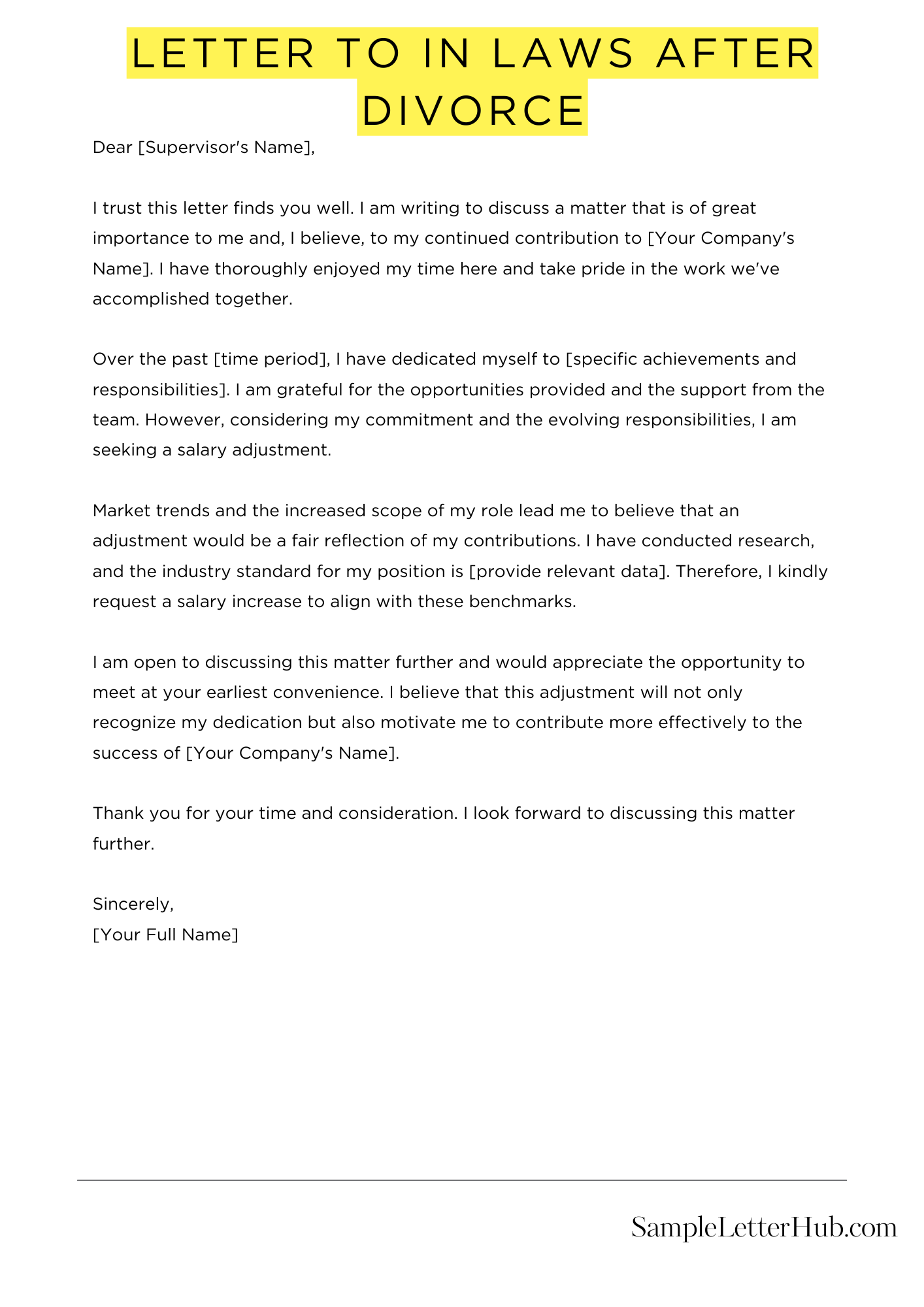When a marriage ends, it can be difficult to know how to communicate with your in-laws. A “Letter to In-Laws After Divorce” can be a way to express your feelings and set boundaries.
In this article, we will share templates, examples, and samples of letters to in-laws after divorce. These letters can be used as a starting point for your own communication.
We hope that these letters will help you to communicate your feelings and set boundaries in a clear and respectful way.
A New Chapter: Reaching Out After Divorce
Dear [In-Laws’ Names],
I hope this letter finds you in good health and spirits. I’ve been contemplating writing to you for some time, and I believe it’s important for us to reconnect, despite the circumstances that have led to our separation from [Ex-Spouse’s Name].
I want to express my gratitude for the years we’ve shared and the memories we’ve made together. I value the bond we’ve built, and I hope we can find a way to preserve it, albeit in a different capacity.
I understand that our divorce may have caused some hurt and confusion. I want to assure you that my decision was not made lightly, and I respect your feelings. I hope that with time, we can all come to terms with this new chapter in our lives.
I’m not asking for us to return to the past, but I’m open to exploring a new kind of relationship with you. I believe that we can still be a source of support and companionship to each other, even if it’s in a different form.
I’m not sure what the future holds, but I’m hopeful that we can find a way to move forward together, with respect and understanding. I’m open to suggestions or ideas on how we can navigate this transition.
Please know that I still care for you deeply, and I value the time we’ve spent together. I hope that you can find it in your hearts to accept my request for a fresh start.
With love and respect,
[Your Name]

How to Write a Letter to In-Laws After Divorce
Writing a letter to your in-laws after a divorce can be a daunting task. You may be feeling a range of emotions, from anger and sadness to guilt and regret. It is important to take your time and carefully consider what you want to say. The following tips can help you write a letter that is both respectful and honest.
1. Start with a Salutation
Begin your letter with a formal salutation, such as “Dear Mr. and Mrs. Smith.” If you are not sure what to call your in-laws, you can simply address them by their first names.
2. Express Your Appreciation
Start by expressing your appreciation for your in-laws’ support during your marriage. Let them know that you value their friendship and that you are grateful for the time you spent with them as a family.
3. Explain Your Decision
In the next paragraph, explain your decision to divorce. Be honest and direct, but avoid being accusatory or blaming. Focus on the reasons why you believe the marriage is no longer working.
4. Express Your Regret
Let your in-laws know that you regret the pain that your divorce has caused them. Explain that you did not make this decision lightly and that you understand how difficult it must be for them.
5. Offer to Stay in Touch
If you are open to staying in touch with your in-laws, let them know. Explain that you value their friendship and that you would like to continue to see them in the future.
6. End with a Closing
End your letter with a closing, such as “Sincerely” or “Best regards.” You can also include a personal touch, such as a handwritten note or a photo of you and your in-laws.
7. Proofread Your Letter
Before you send your letter, take some time to proofread it carefully. Make sure that there are no errors in grammar or spelling. You may also want to have someone else read your letter to get their feedback.
FAQs about Letter To In Laws After Divorce
How do I start a letter to my in-laws after a divorce?
Begin by expressing your gratitude for their support during your marriage. Let them know that you value the relationship you have with them and that you hope to maintain it in some capacity.
What should I say in the body of the letter?
Share your reasons for writing the letter, whether it’s to express your appreciation, apologize for any hurt you may have caused, or simply to let them know how you’re doing. Be honest and open about your feelings, but avoid being accusatory or blaming.
How do I end the letter?
End the letter on a positive note, expressing your hope for the future and your desire to stay connected. Thank them again for their support and let them know that you’re always there for them if they need you.
Should I send a gift with the letter?
Sending a small gift, such as a card or a token of your appreciation, can be a thoughtful gesture. However, it’s not necessary and should not be expected.
What if I’m not sure how they will react?
It’s understandable to be nervous about how your in-laws will react to your letter. However, it’s important to remember that you’re not responsible for their feelings. Be respectful and honest in your communication, and let them know that you value their relationship.

